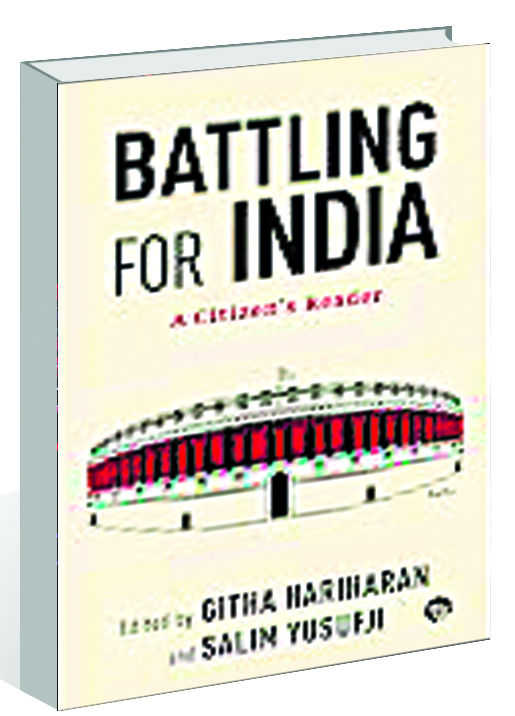
Battling for India: A Citizen’s Reader edited by Githa Hariharan and Salim Yusufji. Speaking Tiger. Pages 338. Rs 399
Gaurav Kanthwal
Why do fiction writers and artists wade into political discourse in their artworks? To express their creativity, beliefs, reflect on the times they are living in, or just to court controversies... There is no straight forward answer, or it has not yet been found. But the closest one can get to answer this vexed question is, perhaps, a desire to have a bit of everything.
Any artwork aspiring to be powerful has to be about people, their lives, their times, and not just about the ideas of the artist. The subject an artist chooses only shows where he stands, his story describes a conflict, and the way he narrates it shows how intensely he feels about a topic. Many writers, even thinkers, believe that they do not choose their subject; it is the society that gives them the material to work on. So, there is no escape from politics as it is what makes up for their environment and the conditions they live in. It then opens up the possibility of an artwork becoming a vehicle of political activism, and sometimes, a means of revolt.
Critiquing majoritarian coercion, market-driven policies and growing inequalities in society is an evergreen topic in the non-fiction genre but the past five years have seen a renewed vigour in this area of interest. Battling for India... adds to it with an anthology of essays, lectures, speeches, poems and caricatures by writers, poets, activists, artists, journalists, teachers and students from all over India. Editors Hariharan and Yusufji have collated materials from various sources. They have divided the book into six parts with a focus on dissenting voices, struggles of the common man, flawed government policies and the challenges before India.
The book mirrors the views of the likes of Shanta Gokhale, K Satchidananadan, Nayantara Sehgal, Shashi Deshpande, Teesta Setalvad, Harsh Mander, Keki Daruwalla and Ashok Vajpeyi whose stance on various political and social issues is well-known. These include some of the writers and poets, who started returning their Sahitya Akademi Awards in 2015 to protest against the increasing incidents of communal violence in India. Their views and reasoning for their rebellious act makes for an interesting read.
P Sainath writes on the ravaging effects of demonetisation on rural economy and the invisible middle class connect with the farmers. Ashok Vajpeyi’s poem, Out of Little Mouths, makes an impact with its eloquent words. Ninety-two-year-old Nayantara Sehgal explains why a writer must keep writing and resist but must not get involved in polemics or propaganda.
Activist Teesta Setalvad in her essay, A Trial by Fire, brings out the collusion of all political parties in ensuring impunity for those in power in cases of mass crimes, listing the reasons behind recurring violence against minorities.
Hariharan and Yusufji introduce this anthology — subtitled A Citizen’s Reader — as a platform where citizens speak and are heard. Their belief is that by recording and analysing the citizens’ voices, there is a better understanding of the nature of citizenship, and hence, the struggle to claim it afresh gets emboldened.
By focusing on the caste-ridden society, poverty, excesses on minorities, unfair wages and rising unemployment, and the skewed nature of resource allocation, the book raises questions about the society’s dominant forces and the futility of Indian political democracy without being a successful social and economic democracy.


























